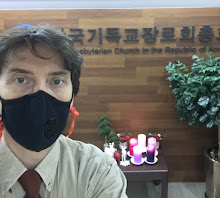I arrived in Korea just in time to be whisked off to Jeju Island for the 103rd General Assembly of the Presbyterian Church in the Republic of Korea, which took place at the Haevichi Resort in Seogwipo-si. Actually, it started with the Pre-Assembly from September 14-17 under the theme Beyond Unification: Asia-Pacific Peace-Zone Consultation. Guests from partner churches in Asia, Europe, Africa, and North America were invited to this consultation to engage with the PROK in discussion about the past, present, and future of the church on the path of the pilgrimage to peace. Discussions were lively and eye-opening, especially the theme presentation by Rev. Dr. Hiheon Kim on Embodying 'Mission and Ecumenism from the Margins' in Transformative Solidarity, which got the discussion rolling.
Here I am, along with several of the international guests, about to be presented to the General Assembly:
And here I am, in my 10 seconds of fame on the big screen!:

A special treat for the assembly was an address by theologian Jürgen Moltmann, who must be well into his nineties. (In German of course, with Korean translation!)
The assembly was held in Jeju this year in part to commemorate the seventieth anniversary of the Jeju 4.3 massacre, in which many of the inhabitants of Jeju were killed during the period of unrest and oppression following WWII and the division of the Korean peninsula. We heard a moving first-hand account of the events from Mrs. Ko Wan-soon, who had experienced them as a child.
Delegates also experienced a group tour of the Jeju 4.3 Peace Park, which is eerie in its silent commemoration of those who died.
Most of the bodies of those who were arrested or killed were never recovered. Every year they discover more remains. They have painstakingly set up graves for each and very one of the victims who have been identified.

I must admit that even though I had been to Jeju before, I had never of the massacre. Here's an article from last March in the Korea Times that give more details:
https://www.koreatimes.co.kr/www/nation/2018/05/281_246214.html
After the consultation we relocated to Haevichi to take part in the opening of the General Assembly, along with 666 Korean delegates from the 28 Presbyteries of the PROK.
Here I am, along with several of the international guests, about to be presented to the General Assembly:
And here I am, in my 10 seconds of fame on the big screen!:
I was pleased to connect with Patti Talbot, who was there to represent the United Church of Canada. Here she is presenting a gift from the United Church to the PROK:

A special treat for the assembly was an address by theologian Jürgen Moltmann, who must be well into his nineties. (In German of course, with Korean translation!)
The assembly was held in Jeju this year in part to commemorate the seventieth anniversary of the Jeju 4.3 massacre, in which many of the inhabitants of Jeju were killed during the period of unrest and oppression following WWII and the division of the Korean peninsula. We heard a moving first-hand account of the events from Mrs. Ko Wan-soon, who had experienced them as a child.
Delegates also experienced a group tour of the Jeju 4.3 Peace Park, which is eerie in its silent commemoration of those who died.
Most of the bodies of those who were arrested or killed were never recovered. Every year they discover more remains. They have painstakingly set up graves for each and very one of the victims who have been identified.

I must admit that even though I had been to Jeju before, I had never of the massacre. Here's an article from last March in the Korea Times that give more details:
https://www.koreatimes.co.kr/www/nation/2018/05/281_246214.html











Comments
Post a Comment